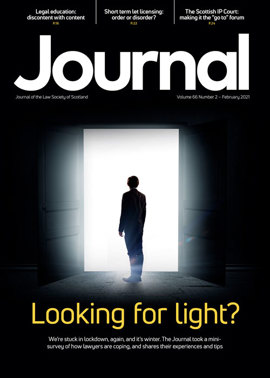TRS: more trusts, more information, more access

HMRC’s Trust Registration Service (TRS) was set up in 2017 to address the requirements of the Fourth Money Laundering Directive and provide information and transparency on trusts to help in the fight against money laundering and terrorist financing. All trusts which incur a liability to any UK tax are already required to register, and the information on the TRS must be kept up to date whenever changes occur.
As part of the implementation of the Fifth Money Laundering Directive (5MLD), TRS is about to undergo some significant changes:
- More trusts will need to register.
- Information held on TRS will be more widely available (but not to the general public unless they have a “legitimate interest”).
- Taxable trusts (which should already have registered) will have to provide more information about their “beneficial owners”.
The vast majority of trusts which are dealt with by Scottish solicitors are private family trusts, and the prospect of money laundering involving them is extremely remote. Trust structures have been used to mask money laundering in Scotland and further afield and, as with so many regulatory requirements, all the conventional innocent structures have to comply so that the authorities have a better chance of identifying those who are not so innocent.
We will mention later the arrangements for access to trust information on TRS, and the requirement to register some non-UK trusts if they acquire UK land or property or enter into a business relationship with a UK adviser, both of which have given rise to considerable concern. For Scottish solicitors, however, the most immediate priority will be to identify the large number of further trusts which will need to be added to TRS, even although they do not currently give rise to a UK tax liability (and may never do so).
Timetable
The new regulations setting out these requirements came into force on 6 October 2020, and trusts which are now required to register have until 10 March 2022 to do so. New trusts set up after 9 February 2022 must register within 30 days. Of course the HMRC system to allow all these new registrations isn’t ready yet, but we are told it should be available in “early spring” 2021.
So what trusts will now need to register? Essentially all UK-resident express trusts come under the new rules, unless they are covered by one of the exemptions specified in the regulations. Express trusts are those deliberately created by the settlor in lifetime or on death, rather than by court order, statute or other legal provision. The exemptions are generally categories of trusts which are deemed to be low risk for anti-money laundering purposes or are adequately regulated already.
Exemptions
The main exemptions affecting our practices are:
- UK registered pension trusts.
- Charitable trusts which are regulated in the UK.
- Certain trusts incidental to commercial transactions or used as part of the infrastructure of financial markets.
- Trusts for vulnerable beneficiaries.
- Trusts for bereaved minors, and 18-25 trusts (both these categories can only be set up under a will for the deceased’s children, not other beneficiaries).
- Personal injury trusts.
- Trusts holding only pure protection life insurance policies. This will include term, critical illness and disablement policies but not whole of life policies or investment bonds.
- Trusts in existence on 6 October 2020 which hold less than £100. These are essentially “pilot trusts”, which have been put in place to receive more substantial assets in the future, possibly from a pension plan or will. Pilot trusts created now will have to register, as will older pilot trusts when they receive additional assets.
- Will trusts created on death which only receive assets from the estate and are wound up within two years of the death. This could cover discretionary or liferent trusts created in a will which the executors decide not to activate, or specifically a two-year discretionary trust designed to take advantage of IHTA 1984, s 144.
- Trusts which receive only death benefits from a life insurance policy which are then wound up within two years of the death. Most such trusts are wound up very quickly after the death, but this exemption will help trusts which only hold term policies (see 7 above).
- Co-ownership trusts where the trustees and beneficiaries are the same people. This exemption mainly addresses the English situation where joint ownership of a property or even a joint bank account creates a form of trust, a complication which we are largely spared in Scotland.
One notable absence from the list of exemptions, despite many representations to the contrary, is bare trusts, despite the fact that they are not really trusts at all. Bare trusts will have to be registered unless they come under one of the specific exemptions.
Non-UK resident trusts
Non-UK resident trusts will have to register if they have at least one UK resident trustee and they either:
- enter into a business relationship with a UK adviser which is expected to last more than 12 months (for example, investment management or continuing legal or tax advice), or
- acquire UK land or property.
Non-UK resident trusts with no UK-resident trustees must also register if they acquire UK land or property, but not if they only come under the business relationship test. Trusts which have to register only under this category will not have their TRS information made accessible.
Information required
All trusts being registered must provide information about each beneficial owner, including their name, country of residence, nationality and the nature and extent of their beneficial interest. Taxable trusts must also provide information about the trust assets and value, although this does not normally need to be updated regularly.
“Beneficial owner” is essentially the term used for any of the parties involved in a trust, even although a Scottish interpretation would not ascribe any ownership, beneficial or otherwise, to most of them. However 5MLD and its predecessors have been drafted largely by officials from countries which don’t use or recognise trusts at all and can’t understand why anyone would be involved in an arrangement if they didn’t have what we would understand as a beneficial interest.
So for the purpose of TRS a beneficial owner includes a settlor, trustee, protector, beneficiary, class of beneficiaries and any other individual who has control over the trust. Where beneficiaries are identified as a class (for example, the issue of a particular person) and the class is not yet fully identifiable, it is sufficient to provide a description of the class. That changes if any individual beneficiary receives any payment or asset from the trust, at which point their personal information must be added.
Access to TRS information
The government recognises that the vast majority of trusts are established for legitimate reasons and, particularly because trusts are so widely used in the UK, has sought a proportionate solution to the information sharing obligations imposed by 5MLD. Access to TRS information is available to four distinct groups:
- Law enforcement agencies.
- “Obliged entities” – essentially firms who are themselves subject to the requirements of 5MLD – these do not have access to TRS itself but must see a copy of the trust’s TRS entry before entering into a business relationship.
- Third parties with a legitimate interest in obtaining the information. The decision on whether the interest is legitimate and whether information should therefore be released will be made by HMRC.
- Third parties (not necessarily with a legitimate interest) if the trust holds a controlling interest in a non-EEA legal entity which is not required to register in an EU member state. The justification for this is that layered ownership of this sort poses a greater risk of money laundering or terrorist financing.
What must trustees do now?
A huge number of trusts will now have to register on TRS, so trustees and their advisers should start identifying those trusts and assembling the information which will need to be added to TRS, even although the deadline is still more than a year off and the system is not yet available for use.
Of course many people will not realise or remember that they have created a trust (particularly with life polices), or know that they are trustees, and HMRC has a communication plan to attempt to inform these people about the new requirements. HMRC recognises, however, that many lay people will not register their trusts and the penalty regime is deliberately “soft” to accommodate such situations.
That will not help us as advisers, particularly where we or our colleagues may be trustees of trusts, and each of us will have to develop a plan for identifying the trusts which need to be registered and gathering the information required. All this, and then dealing with the registration itself, will take time and cost money, and a major concern is whether clients (be they settlors, trustees or beneficiaries) are going to be prepared to pay for it.
There is a real danger that this additional regulatory requirement and the associated costs and potential loss of confidentiality will discourage clients from setting up or continuing trusts, even though the protections which they provide for the trust assets and beneficiaries can be absolutely vital and cannot be provided as effectively by just about any other type of structure.
So the challenges for trust advisers are twofold, not just explaining and complying with the new TRS requirements (and getting paid for doing so!), but also being ambassadors for the trust concept and the many situations where a trust can benefit individual clients, families and businesses.
Further information is available on the HMRC website.
Regulars
Perspectives
Features
Briefings
- Criminal court: Discount season
- Family: Capital values in uncertain times
- Employment: Can employers require staff vaccination?
- Human rights: Protecting the child claimant
- Pensions: a bill with teeth
- Charities: commerce as public benefit?
- Property: Playing safe: on the right track?
- In-house: Wide world of in-house
In practice
- Priorities for our Parliament
- The Word of Gold: The gift that keeps on giving
- TRS: more trusts, more information, more access
- A proper conclusion
- The Eternal Optimist: Putting resolve into resolutions
- Appreciation: Professor Emeritus Robert Rennie
- Ask Ash: Trainee in a rut
- Royal Faculty invites new members







